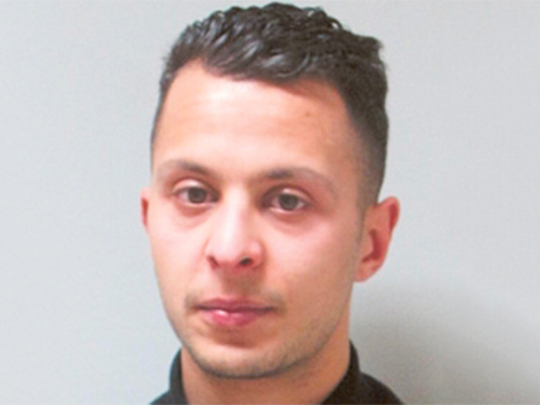
Paris: Paris attacks suspect Salah Abdeslam arrived at a court in the French capital on Wednesday where he was to be grilled by investigating judges following his extradition from Belgium.
Abdeslam, a French national of Moroccan origin who grew up in Belgium, is believed to be the last surviving member of the terror squad that killed 130 people in Paris on November 13.
His French lawyer, Frank Berton, told regional newspaper Voix du Nord that his client was “anxious to explain himself” in France. He said he had spoken to Abdeslam only once and had found him “very despondent”.
Paris prosecutor Francois Molins said the 26 year old was formally placed under arrest after arriving on French soil at 9.05am (0705 GMT).
“He will be presented to judges during the day with a view to being charged,” Molins said in a statement.
At around 11am, Abdeslam arrived at Paris’s main courthouse in a convoy of four cars carrying heavily armed security forces wearing balaclavas. He was still there some five hours later.
Justice Minister Jean-Jacques Urvoas said the suspect would be placed in isolation in a prison in Paris and monitored by “hardened guards trained in the detention of persons believed to be dangerous”.
Sources close to the investigation said he would be sent to the overcrowded prison of Fleury-Merogis, Europe’s biggest jailhouse.
Jean Reinhart, a lawyer for about 30 families of the attack victims, hailed the extradition, saying “justice is on its way”.
“He knows a lot of things. He has made a lot of statements that he would talk, I hope he stays in that state of mind,” said Georges Saline, whose daughter was killed at the Bataclan concert hall along with 89 others.
Abdeslam was arrested in Brussels on March 18 after four months on the run as Europe’s most wanted man.
Prosecutors believe he was in charge of logistics for the coordinated series of attacks on Paris cafes, the Bataclan and the national stadium, which were planned in Brussels.
Abdeslam rented the cars that the Daesh squad used to travel to Paris, and booked the rooms where they stayed before launching the attack.
His brother, Brahim, detonated his suicide vest in a bar, and Abdeslam himself said he had been expected to do the same outside the national stadium, but had backed out at the last minute.
After revealing that nugget of information in his first interrogation, Abdeslam has remained mum.
Abdeslam’s arrest came just days before coordinated attacks on Brussels airport and a metro station that left 32 people dead.
Police have uncovered clear links between Abdeslam and the three Brussels suicide bombers, but he has said through his Belgian lawyer that he knew nothing about the attack.
Last month, Belgian police arrested another key Paris suspect called Mohammad Abrini, who was seen with Abdeslam before the attacks, and who also turned out to be the so-called “man in the hat” seen in CCTV footage with two bombers shortly before they staged the Brussels airport assault.
Abrini grew up with Abdeslam in the gritty Brussels suburb of Molenbeek along with several other suspects, who all share a similar story of getting on the wrong side of the law and becoming radicalised.
His Belgian lawyer, Sven Mary, gave a lengthy interview to the Liberation newspaper that appeared on Wednesday, describing the difficulty of representing such an infamous client.
“There have been moments when I thought of giving up. If I had known about the Brussels attacks, maybe I would never have taken this case,” Mary said.
He described his client as a “little moron from Molenbeek, more a follower than a leader. He has the intelligence of an empty ashtray. He is the perfect example of the GTA [Grand Theft Auto video game] generation who thinks he lives in a video game.
“I asked him if he had read the Quran, and he replied that he had researched it on the internet.”
The attacks suspects should be judged by an “international criminal court,” he said.
“These people committed acts of war.”
Mary said he had spoken to Abdeslam seven or eight times and he still was unsure how his client had ended up radicalised.
“A year and a half ago he was clubbing in Amsterdam. The only explanation I can find is that it was internet propaganda that gave the impression that Muslims were unfairly treated,” he told Liberation.
Mary blames Paris prosecutor Molins for his client’s silence since he was first questioned.
Molins revealed the contents of the interrogation to French journalists, and Mary filed a complaint against him for doing so.
“I think Salah Abdeslam is of capital importance to this investigation. I would even say he is worth gold. He cooperates, he communicates,” Mary said.












